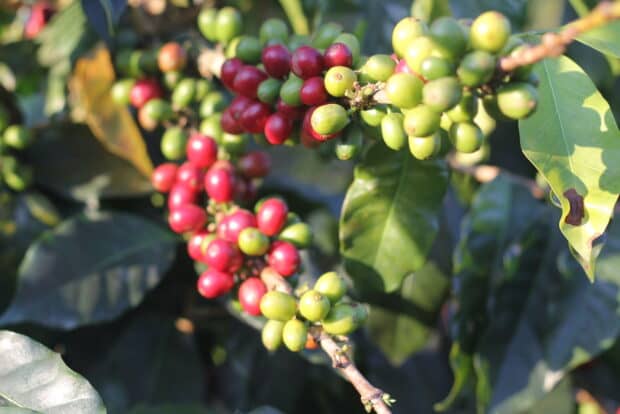An established coffee farm. New EU legislation will require EU companies to manage risk of deforestation in their supply chains. Daily Coffee News photo.
As compliance deadlines for the new EU Deforestation Regulation (EUDR) loom, the nonprofit Fairtrade International has announced a three-year partnership with the Dutch firm Satelligence for widespread monitoring of coffee and cocoa farm land.
According to Bonn, Germany-based Fairtrade International, the initiative is designed to arm Fairtrade-certified coffee and cocoa cooperatives with data on the farms that supply them, in order for them to share data with commercial partners to identify deforestation risks.
“The Fairtrade-Satelligence partnership and expansion plan will also support producer organizations — representing more than one million coffee and cocoa farmers cultivating 2.5 million hectares — to meet the European Union Deforestation Regulation requirements so they can maintain access to important markets in Europe and beyond,” Fairtrade International said in an announcement of the partnership today.
European legislators finalized the sweeping new deforestation-free laws in June 2023, giving large operators 18 months to comply, while extending a longer timeline for small and “micro” companies.
The laws require EU sellers or exporters of agriculture-based products — such as soy, beef, palm oil, wood, cocoa, coffee, rubber, or derived products such as leather, chocolate, tires or furniture — to meet due diligence and mitigation requirements regarding deforestation in their supply chains.
The law is intended to address some of the largest drivers of deforestation in the supply chains of EU companies, while protecting forests and biodiversity.
The most recent Coffee Barometer report (2023) suggested that European companies dealing in coffee trading and roasting are generally not prepared for EU compliance. The authors of that report wrote, “The magnitude of the mandatory requirements expected in the coffee industry is significant, and it is clear that many coffee companies are ill-equipped to handle this transformation.”
The authors of the Coffee Barometer and other sources have warned that the actors most likely to be adversely affected by the new legislation are small-scale farmers, who will be forced to comply yet may lack the financial or technical tools required to meet changing demand.
Fairtrade International, which historically has a stated focus to protect the interests of small-scale, or “smallholder,” farmers said the initiative with Satelligence is designed in part to give producer groups and farmers additional tools for compliance, while identifying risk for downstream actors.
Fairtrade International and Satelligence plan to implement the monitoring system at all Fairtrade-certified coffee- or cocoa-producing producer groups globally by 2025.
“Our collective goal is that farmers have the data they need to move forward in a changing regulatory environment, which ultimately contributes to their sustainability as businesses and communities,” Arisbe Mendoza, director of global impact for Fairtrade International, said in today’s announcement. “The partnership provides a proven satellite monitoring system combined with technical support from Fairtrade to interpret and manage the data on an ongoing basis. This is an important step in our journey to bring more transparency to supply chains.”
Fairtrade International recently initiated a historic increase to its price minimums and premiums associated with certified coffees.
Does your coffee business have news to share? Let DCN’s editors know here.
Nick Brown Nick Brown is the editor of Daily Coffee News by Roast Magazine.


